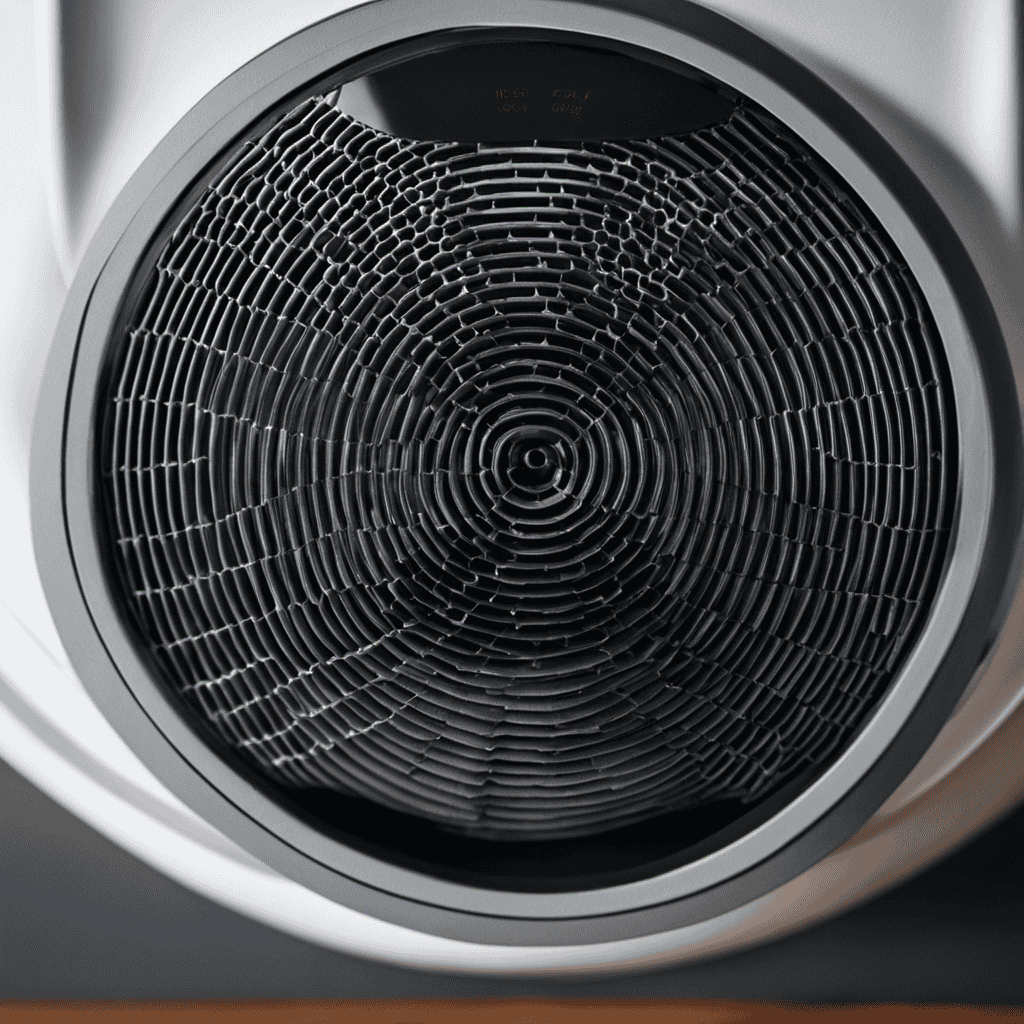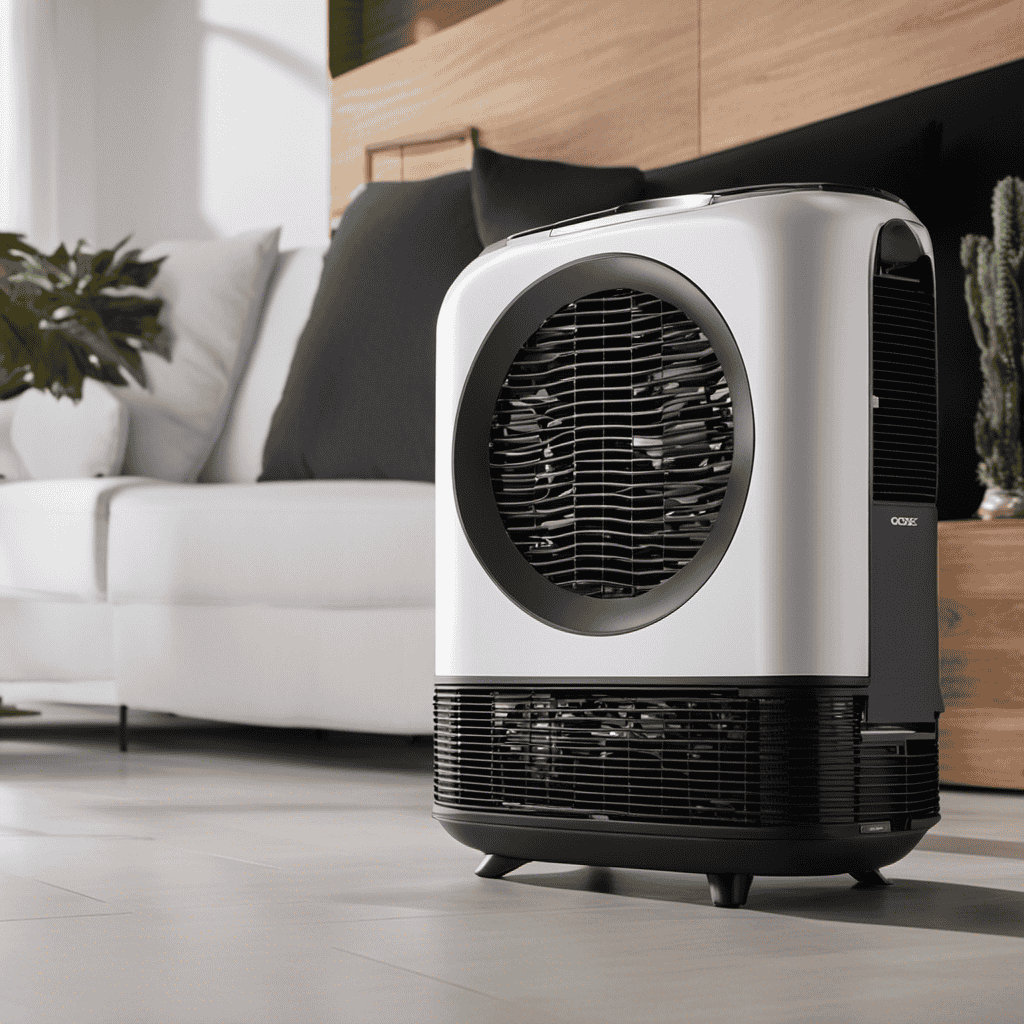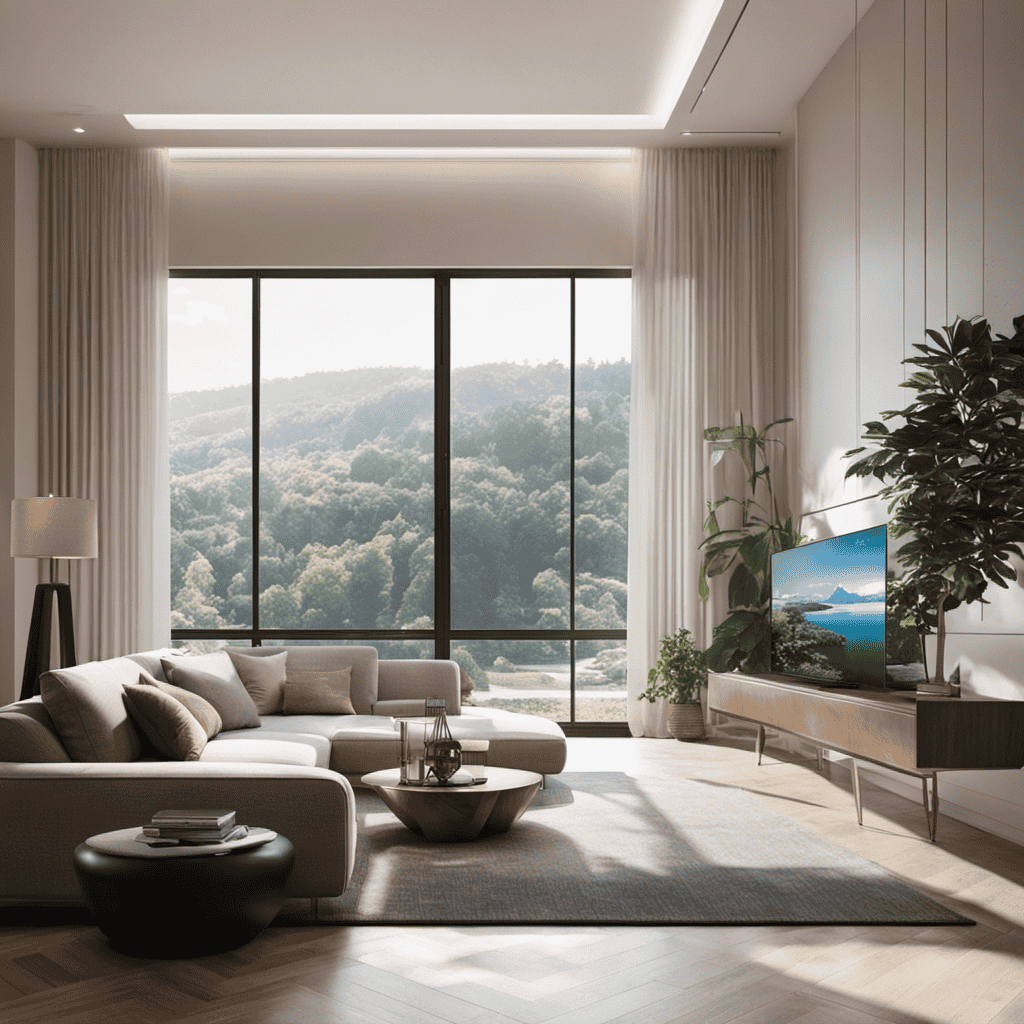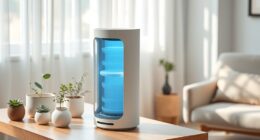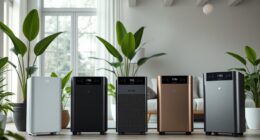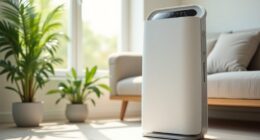Are you aware of the importance of the filters in the Blueair Blue Air Purifier in keeping indoor air clean and healthy? Over time, these filters can get clogged with pollutants, diminishing their ability to work effectively.
As an owner of this innovative purifier, I have often wondered how often these filters should be replaced for optimal performance. In this article, we will explore the recommended filter replacement frequency, factors that affect their lifespan, and signs that indicate it’s time for a replacement.
Plus, we’ll share some tips on proper maintenance to prolong the filter’s life.
Key Takeaways
- Regular filter replacement every six months is important to maintain optimal performance of the Blueair Blue air purifier.
- Neglecting filter replacement can lead to decreased efficiency and increased costs.
- Signs that filters need to be replaced include reduced air flow, visible dirt or debris on the filter, unpleasant odors in the air, and increased frequency of allergies or asthma symptoms.
- Proper maintenance, such as regularly cleaning and vacuuming the exterior of the air purifier, can help prolong the filter life.
Importance of Filter Replacement
You need to regularly replace the filters in your Blueair Blue air purifier to ensure its effectiveness. Regular filter replacement offers several benefits for your air purifier and indoor air quality.
First and foremost, it helps maintain optimal performance by ensuring that the purifier can effectively remove pollutants from the air. Over time, filters can become clogged with dust, allergens, and other particles, reducing their efficiency.
By replacing the filters regularly, you can ensure that your air purifier continues to provide clean and healthy air for you and your family. Common misconceptions about filter lifespan include the belief that filters only need to be replaced when visibly dirty. However, waiting for visible dirt can be too late, as it may indicate reduced filtration efficiency.
Therefore, it is important to follow the manufacturer’s recommendations and replace your filters regularly to enjoy the full benefits of your Blueair Blue air purifier.
Factors Affecting Filter Lifespan
One factor that affects the lifespan of the filters in my Blueair purifier is the level of air pollution in my environment. The more polluted the air, the harder the filters have to work to remove contaminants, which can decrease their efficiency and shorten their lifespan.
It is important to regularly monitor the air quality in my surroundings and adjust the filter replacement schedule accordingly.
Another factor to consider is the filter efficiency. Blueair filters are designed to capture a high percentage of airborne particles, but over time, their effectiveness may decrease. It is recommended to replace the filters every six months to maintain optimal performance.
While filter replacement costs may vary depending on the specific model, investing in new filters is necessary to ensure the purifier continues to provide clean and healthy air.
Recommended Filter Replacement Frequency
The recommended frequency for replacing the filters in my Blueair purifier is every six months to maintain optimal performance. Regular filter replacement is crucial for ensuring clean and healthy indoor air. Neglecting to replace filters can lead to decreased air purifier efficiency and increased filter replacement costs in the long run.
Here are three important points to consider regarding filter replacement in Blueair purifiers:
-
Filter Replacement Costs: While the initial cost of the purifier itself may be an investment, it is important to factor in the ongoing cost of filter replacements. Regular filter replacements every six months help maintain the efficiency and effectiveness of the purifier, which in turn ensures clean air and a healthier living environment.
-
Impact of Air Quality on Filter Lifespan: The lifespan of the filters is greatly influenced by the air quality in the surrounding environment. If the air quality is poor or if the purifier is placed in a highly polluted area, the filters may get clogged faster and require more frequent replacements.
-
Optimal Performance: Replacing the filters every six months ensures that the purifier continues to perform at its best, effectively capturing airborne pollutants such as dust, allergens, and pet dander. This promotes better indoor air quality and helps alleviate allergy symptoms.
Regular filter replacements are essential to maintain the efficiency and effectiveness of Blueair purifiers. Neglecting to replace filters can lead to decreased performance and increased filter replacement costs.
Signs That Filters Need to Be Replaced
If filters aren’t regularly replaced, it can result in decreased performance and higher costs for replacements. It is essential to recognize the signs indicating filter replacement is needed to maintain the optimal functioning of your Blueair Blue air purifier. Here are some indicators to look out for:
| Signs indicating filter replacement needed |
|---|
| Reduced air flow |
| Visible dirt or debris on the filter |
| Unpleasant odors in the air |
| Increased frequency of allergies or asthma symptoms |
Timely filter replacement offers several benefits. Firstly, it ensures that your air purifier continues to effectively remove airborne pollutants, such as dust, pollen, and pet dander. Secondly, it helps maintain good indoor air quality, promoting a healthier living environment. Lastly, regular filter replacement can extend the lifespan of your air purifier, saving you money in the long run.
To properly maintain and prolong the life of your filters, it is important to follow some simple guidelines. Transitioning into the next section, let’s explore the steps for proper maintenance and care of your Blueair Blue air purifier.
Proper Maintenance for Prolonging Filter Life
To properly maintain and prolong your filter’s life, you should regularly clean and vacuum the exterior of your air purifier. This will help prevent dust and debris from accumulating on the filter, which can reduce its effectiveness over time. Additionally, cleaning the exterior of the purifier will help to ensure that air can flow freely through the unit, allowing it to operate at its optimal level.
Here are three important steps to follow when cleaning your air purifier:
- Use a soft, dry cloth to gently wipe down the exterior of the unit, removing any dust or dirt that may have accumulated.
- Use a vacuum cleaner with a brush attachment to remove any dust or debris from the vents and grilles of the purifier.
- Check the manufacturer’s instructions for any specific cleaning recommendations or guidelines for your particular model.
Frequently Asked Questions
Can I Use Filters From Other Brands in My Blueair Blue Air Purifier?
No, it is not recommended to use filters from other brands in the Blueair Blue Air Purifier. The purifier is designed to work specifically with Blueair filters, ensuring optimal performance and compatibility.
How Do I Know if My Filter Needs to Be Replaced Earlier Than the Recommended Frequency?
To determine if my filter needs replacing earlier than recommended, I can check for signs of a clogged filter, like reduced airflow or a musty odor. Cleaning the Blueair Blue Air Purifier filters regularly can extend their lifespan.
What Happens if I Don’t Replace the Filters in My Blueair Blue Air Purifier?
Not replacing the filters in my Blueair Blue Air Purifier can lead to reduced air quality and increased exposure to pollutants. Regularly replacing the filters ensures optimal performance and cleaner air.
Are There Any Alternative Methods to Clean the Filters Instead of Replacing Them?
There are no alternative cleaning methods for Blueair Blue Air Purifier filters. Regular replacement is necessary to maintain optimal performance. Following maintenance tips, such as vacuuming the pre-filter, can extend filter life.
Can I Wash the Filters in My Blueair Blue Air Purifier to Extend Their Lifespan?
No, washing the filters in the Blueair Blue Air Purifier is not recommended. Regular cleaning of the filters is necessary for proper filter maintenance, but replacing them is the most effective method.
Conclusion
In conclusion, the filters in the Blueair Blue air purifier play a crucial role in maintaining clean and healthy indoor air. Regular filter replacement is essential to ensure optimal performance and effectiveness.
Factors such as air quality, usage time, and environmental conditions can affect the lifespan of the filters. It is recommended to replace the filters every six months for maximum efficiency.
By properly maintaining and replacing the filters, you can symbolically breathe in pure and refreshing air, safeguarding your well-being.

